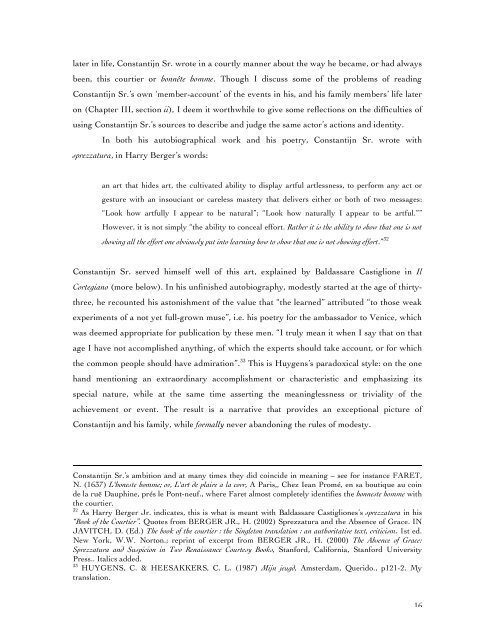Christiaan Huygens – A family affair - Proeven van Vroeger
Christiaan Huygens – A family affair - Proeven van Vroeger
Christiaan Huygens – A family affair - Proeven van Vroeger
You also want an ePaper? Increase the reach of your titles
YUMPU automatically turns print PDFs into web optimized ePapers that Google loves.
later in life, Constantijn Sr. wrote in a courtly manner about the way he became, or had always<br />
been, this courtier or honnête homme. Though I discuss some of the problems of reading<br />
Constantijn Sr.’s own ‘member-account’ of the events in his, and his <strong>family</strong> members’ life later<br />
on (Chapter III, section ii), I deem it worthwhile to give some reflections on the difficulties of<br />
using Constantijn Sr.’s sources to describe and judge the same actor’s actions and identity.<br />
In both his autobiographical work and his poetry, Constantijn Sr. wrote with<br />
sprezzatura, in Harry Berger’s words:<br />
an art that hides art, the cultivated ability to display artful artlessness, to perform any act or<br />
gesture with an insouciant or careless mastery that delivers either or both of two messages:<br />
“Look how artfully I appear to be natural”; “Look how naturally I appear to be artful.””<br />
However, it is not simply “the ability to conceal effort. Rather it is the ability to show that one is not<br />
showing all the effort one obviously put into learning how to show that one is not showing effort.” 32<br />
Constantijn Sr. served himself well of this art, explained by Baldassare Castiglione in Il<br />
Cortegiano (more below). In his unfinished autobiography, modestly started at the age of thirty-<br />
three, he recounted his astonishment of the value that “the learned” attributed “to those weak<br />
experiments of a not yet full-grown muse”, i.e. his poetry for the ambassador to Venice, which<br />
was deemed appropriate for publication by these men. “I truly mean it when I say that on that<br />
age I have not accomplished anything, of which the experts should take account, or for which<br />
the common people should have admiration”. 33 This is <strong>Huygens</strong>’s paradoxical style: on the one<br />
hand mentioning an extraordinary accomplishment or characteristic and emphasizing its<br />
special nature, while at the same time asserting the meaninglessness or triviality of the<br />
achievement or event. The result is a narrative that provides an exceptional picture of<br />
Constantijn and his <strong>family</strong>, while formally never abandoning the rules of modesty.<br />
Constantijn Sr.’s ambition and at many times they did coincide in meaning <strong>–</strong> see for instance FARET,<br />
N. (1637) L'honeste homme; ov, L'art de plaire a la covr, A Paris,, Chez Iean Promé, en sa boutique au coin<br />
de la ruë Dauphine, prés le Pont-neuf., where Faret almost completely identifies the honneste homme with<br />
the courtier.<br />
32 As Harry Berger Jr. indicates, this is what is meant with Baldassare Castigliones’s sprezzatura in his<br />
“Book of the Courtier”. Quotes from BERGER JR., H. (2002) Sprezzatura and the Absence of Grace. IN<br />
JAVITCH, D. (Ed.) The book of the courtier : the Singleton translation : an authoritative text, criticism. 1st ed.<br />
New York, W.W. Norton.; reprint of excerpt from BERGER JR., H. (2000) The Absence of Grace:<br />
Sprezzatura and Suspicion in Two Renaissance Courtesy Books, Stanford, California, Stanford University<br />
Press.. Italics added.<br />
33 HUYGENS, C. & HEESAKKERS, C. L. (1987) Mijn jeugd, Amsterdam, Querido., p121-2. My<br />
translation.<br />
16


